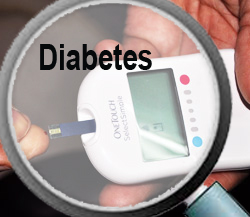
Diabetes mellitus or as it is called the world over, Diabetes is one of few diseases that pose gravest health concerns and medical challenges. Diabetes in most cases is a chronic disorder that manifests into other severe health complications or contribute to other diseases and malfunctioning. According to latest statistics provided by the World Health Organization 347 million people around the world suffer from one type of diabetes mellitus. As the trend shows in few decades from now it is destined to be one of the top ten leading cause of death. Diabetes mellitus mainly occurs due to non production of insulin hormone by the pancreas or insulin resistance developed in the body causing higher level of blood glucose and consequent complications. With billions of medical dollars spent on diabetes research, presently researchers became able to identify certain organic ingredients and factors that in future can produce a conclusive cure for the disease.
Clinical definition of diabetes mellitus
Insulin is the hormone which is responsible for controlling glucose level in the blood as it helps the body cells to consume glucose in the process of metabolism. In medical terms diabetes mellitus refers to the medical condition when the pancreas stops producing insulin resulting in high level of blood glucose or when the metabolic process of the body cannot use the insulin produced by the pancreas due to developed resistance and consequently the blood glucose level increases. Insulin is the hormone which is responsible for controlling glucose level in the blood as it helps the body cells to consume glucose in the process of metabolism. In one type insulin is not produced at all or produced in less quantity than the required level, in other type the produced insulin is not used by the body for glucose consumption due to insulin resistance.
Types of Diabetes mellitus
In the first type the non-functioning or poorly functioning beta cells of the pancreas that do not produce insulin as per normal metabolic requirement is the main culprit, whereas in the second type body's resistance to insulin hormone and consequent non consumption of glucose by the body cells and resulting high concentration of unconsumed glucose in the blood poses the medical challenge. These two types of diabetes mellitus are respectively categorized as diabetes mellitus 1 and diabetes mellitus 2. The first one is insulin dependent diabetes to be addressed medically with alternative supply of insulin while the second one is non insulin dependent diabetes to be addressed with host of medical procedures and lifestyle measures to curb the insulin resistance, glucose level and thereby trying to ensure stability and balance in metabolic process. Another type of diabetes is the gestational diabetes which occurs in some women during pregnancy and high level of blood glucose is observed. Though the exact medical factor causing this type of diabetes mellitus is still unknown, it is assumed that it occurs mainly due to insulin resistance caused by some hormonal dysfunction in the birth process. Gestational diabetes normally grows into diabetes mellitus type 2 in later period.
The symptoms of diabetes mellitus
The symptoms of diabetes mellitus vary according to the type of the disease the person is affected with. Type 1 diabetes mellitus which is mainly occurred due to non production of insulin is less common and occurs mainly in children and adolescents. Type 2 diabetes mellitus accounts for more than 80% of diabetes cases worldwide and can affect any individual, though more common in older people. Gestational diabetes mellitus as we have already seen is a type of diabetes that occurs in some pregnant women and accounts for a minor percentage of cases as compared to others. Here below we provide symptoms of these 3 types of diabetes mellitus separately. Though several symptoms are common to all types of diabetes we would mention them under every type.
Symptoms of type 1 Diabetes mellitus
Symptoms of type 2 Diabetes Mellitus
Symptoms of Gestational Diabetes Mellitus
|
|


Comments: